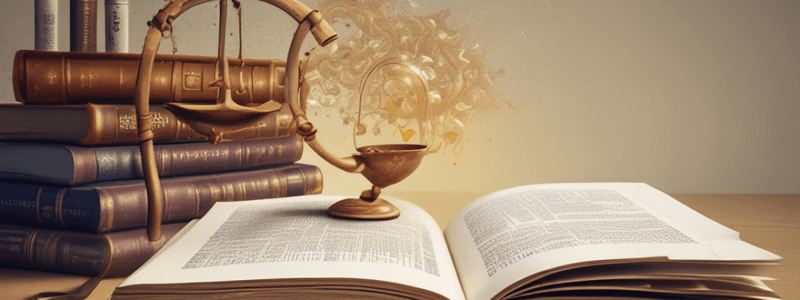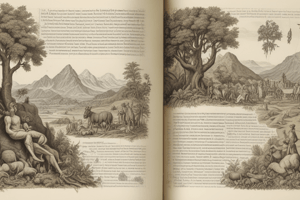Podcast
Questions and Answers
What is the primary focus of natural law thinking?
What is the primary focus of natural law thinking?
- Economic principles
- Moral and philosophical principles (correct)
- Scientific laws of nature
- Historical events
What does 'natural' refer to in natural law?
What does 'natural' refer to in natural law?
- Something independent of human will (correct)
- Subject to human preferences
- Based on social conventions
- Something created by humans
What is the status of human law that violates natural law?
What is the status of human law that violates natural law?
- Morally binding (duty to obey)
- Legally and morally binding
- Not morally binding (duty to challenge) (correct)
- Legally binding (no duty to challenge)
Which term is NOT mentioned as one of the three key periods of shifts in natural law thinking?
Which term is NOT mentioned as one of the three key periods of shifts in natural law thinking?
In the modern/secular Natural Law perspective, what are the necessary conditions of human life?
In the modern/secular Natural Law perspective, what are the necessary conditions of human life?
What does Natural Law consider as just law?
What does Natural Law consider as just law?
What distinguishes natural law from human-made positive law?
What distinguishes natural law from human-made positive law?
What type of actions does natural law thinking aim to guide according to the text?
What type of actions does natural law thinking aim to guide according to the text?
How does the teleological conception of Natural Law view nature?
How does the teleological conception of Natural Law view nature?
According to Greco-Roman/Ancient/Classical Natural Law, what is universal law based on?
According to Greco-Roman/Ancient/Classical Natural Law, what is universal law based on?
What is the key distinction that the text asks readers to be aware of regarding natural law?
What is the key distinction that the text asks readers to be aware of regarding natural law?
What type of rights are described as 'negative' in the text?
What type of rights are described as 'negative' in the text?
In natural law thinking, what major shift occurs from the Classical to the Modern period?
In natural law thinking, what major shift occurs from the Classical to the Modern period?
What emerged as a response to natural law during its decline in the modern period?
What emerged as a response to natural law during its decline in the modern period?
What is the purpose of a civil government according to the text?
What is the purpose of a civil government according to the text?
What does the shift from Classical to Modern natural law emphasize regarding human behavior?
What does the shift from Classical to Modern natural law emphasize regarding human behavior?
What was the primary contribution of Ockham in the theological debates of the 13th-17th centuries?
What was the primary contribution of Ockham in the theological debates of the 13th-17th centuries?
What was the significance of Ockham's view that humans cannot have access to the eternal law through rational knowledge?
What was the significance of Ockham's view that humans cannot have access to the eternal law through rational knowledge?
What was the primary driving force behind the emergence of secular (nonreligious) natural law theories in the 17th and 18th centuries?
What was the primary driving force behind the emergence of secular (nonreligious) natural law theories in the 17th and 18th centuries?
What were the two principles on which modern natural law theories were based, according to the text?
What were the two principles on which modern natural law theories were based, according to the text?
Which of the following statements best represents the impact of Ockham's nominalist philosophy on the development of modern natural law theories?
Which of the following statements best represents the impact of Ockham's nominalist philosophy on the development of modern natural law theories?
Which of the following statements is NOT true about the impact of the Enlightenment on the development of modern natural law theories?
Which of the following statements is NOT true about the impact of the Enlightenment on the development of modern natural law theories?
According to Plato, what is the source of universal law and morality?
According to Plato, what is the source of universal law and morality?
What is the primary role of the philosopher kings in Plato's ideal state?
What is the primary role of the philosopher kings in Plato's ideal state?
How does Aristotle's view of nature differ from Plato's?
How does Aristotle's view of nature differ from Plato's?
According to Aristotle, what is the telos (purpose) of human beings?
According to Aristotle, what is the telos (purpose) of human beings?
What is the role of the judge, according to Aristotle's concept of phronesis (practical wisdom)?
What is the role of the judge, according to Aristotle's concept of phronesis (practical wisdom)?
How did the Stoics influence the reception of natural law in Rome?
How did the Stoics influence the reception of natural law in Rome?
Flashcards
Natural Law
Natural Law
Moral principles inherent in nature, discoverable through reason.
Human Law
Human Law
Laws created by humans; legitimacy questioned if violating natural law.
Negative Rights
Negative Rights
Freedoms requiring non-interference from others.
Historical Shifts
Historical Shifts
Signup and view all the flashcards
Necessary Conditions
Necessary Conditions
Signup and view all the flashcards
Positive Law
Positive Law
Signup and view all the flashcards
Ethical Action
Ethical Action
Signup and view all the flashcards
Teleological View
Teleological View
Signup and view all the flashcards
Universal Law
Universal Law
Signup and view all the flashcards
Civil Government
Civil Government
Signup and view all the flashcards
Governance Focus
Governance Focus
Signup and view all the flashcards
Ockham's Nominalism
Ockham's Nominalism
Signup and view all the flashcards
Enlightenment Influence
Enlightenment Influence
Signup and view all the flashcards
Key Principles
Key Principles
Signup and view all the flashcards
Plato's Source
Plato's Source
Signup and view all the flashcards
Philosopher Kings
Philosopher Kings
Signup and view all the flashcards
Aristotle's Nature
Aristotle's Nature
Signup and view all the flashcards
Telos for Humans
Telos for Humans
Signup and view all the flashcards
Phronesis
Phronesis
Signup and view all the flashcards
Stoic Influence
Stoic Influence
Signup and view all the flashcards
Just Law
Just Law
Signup and view all the flashcards
Study Notes
Natural Law Focus
- Primary focus of natural law thinking is the moral principles inherent in nature.
- 'Natural' refers to the idea that these laws are universal and can be understood through human reason.
Human Law and Natural Law
- Human laws that violate natural law lack legitimacy and moral authority.
- Negative rights in natural law are those that require others to abstain from interference (e.g., freedom of speech).
Historical Shifts in Natural Law
- Three key periods of shifts: Classical, Medieval, and Modern.
- Key distinctions in periods highlight changes in understanding the source and application of natural law.
Modern/Secular Natural Law Perspective
- Necessary conditions of human life include moral order and rational thought.
- Just law is aligned with natural law principles, promoting human flourishing.
Distinctions in Law
- Natural law differs from positive law, which is man-made and may not reflect inherent moral truths.
- Natural law guides moral and ethical actions, directing human conduct towards the common good.
Teleological View of Nature
- Teleological conception sees nature as having a purposeful design, with laws reflecting this purpose.
- Universal law, in Greco-Roman tradition, is based on the inherent nature of humanity and the cosmos.
Key Distinctions and Shifts
- Distinguishing between classical natural law and modern interpretations is crucial for understanding its evolution.
- A major shift from Classical to Modern natural law emphasizes individual rights and human behavior in a secular framework.
The Role of Civil Government
- Purpose of civil government is to protect natural rights and ensure a just society.
- The shift emphasizes governance by reason and consensus rather than divine mandate.
Contributions of Ockham
- Ockham's nominalism influenced theological debates, asserting humans cannot fully access eternal law through reason.
- He contributed to the secularization of natural law theories in the 17th and 18th centuries.
Enlightenment Influence
- Enlightenment thinking drove secular natural law theories, focusing on human reason and individualism.
- Two key principles: moral objectivity and the universality of natural rights.
Philosophical Insights
- Plato attributes the source of universal law and morality to a transcendent realm of forms or ideals.
- Philosopher kings in Plato's ideal state are meant to govern based on wisdom and knowledge of true goodness.
Aristotle's Contributions
- Aristotle views nature as a rational order, differing from Plato's idealistic framework.
- Telos for human beings is achieving virtue and fulfilling one's potential.
Role of Judges in Aristotle's Thought
- Judges embody phronesis (practical wisdom), applying knowledge to discern justice in particular cases.
- Stoics influenced the reception of natural law in Rome by emphasizing the unity of reason and nature, leading to a more universal application of natural law.
Studying That Suits You
Use AI to generate personalized quizzes and flashcards to suit your learning preferences.




